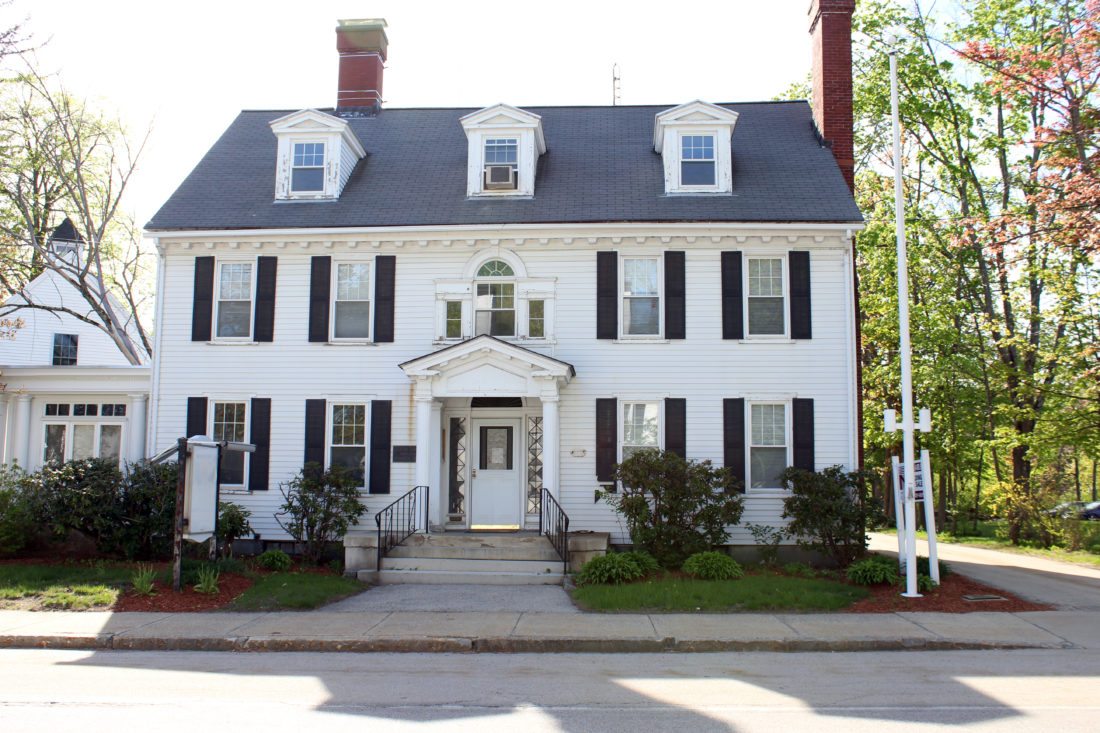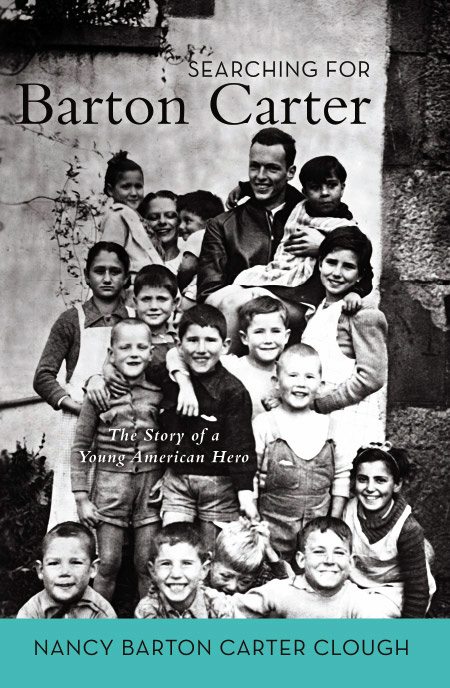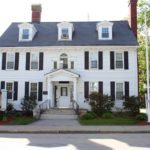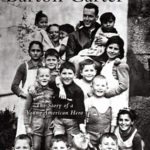Searching for Barton Carter
Tracing the unlikely journey of Nashua native and Spanish Civil War hero

Staff photo by Hannah LaClair The American Red Cross chapter house, 28 Concord St., Nashua, was dedicated to Barton Carter in 1941. The building is currently for sale.
- Staff photo by Hannah LaClair The American Red Cross chapter house, 28 Concord St., Nashua, was dedicated to Barton Carter in 1941. The building is currently for sale.
- Courtesy photo The cover of Nancy Barton Carter Clough’s book, “Searching for Barton Carter: The Story of a Young American Hero.”
Most any Nashuan of a certain age recognizes the surname Carter, which of course belongs to the family of industrialists, businessmen and
philanthropists whose Nashua Corporation and associated ventures employed thousands of Nashuans over many decades and generated capital for more than a few community endeavors – the Nashua Public Library, for one.
The Cloughs, primarily Charles Clough – Nancy’s husband – steered Nashua Corporation through years of diversification, eventually creating and overseeing four main business divisions toward the end of the 20th century.
So that brings us to Barton – which unlike the others is not a surname, but a given name, belonging to a young man who, some 80 years after he disappeared in the mountains of war-torn northern Spain, is the subject of his niece’s new book.

Courtesy photo The cover of Nancy Barton Carter Clough's book, "Searching for Barton Carter: The Story of a Young American Hero."
Barton Carter by any measure stuffed a lot of life and good deeds into his mere 23 years. Born to Winthrop L. and Elizabeth Conant Barton Carter in 1915, he attended private schools, the first of which I’d never even heard of until Nancy mentioned it in her presentation.
Which of course sent me scurrying to find out how this place escaped my notice for so long. Turns out it was a small school called Thurston Hall, owned and operated by a Mrs. J. M. MacDuffie, in whose home classes were held.
A notice in the Sept. 5, 1933 Nashua Telegraph states that classes would temporarily be held in the Manchester Street home of Miss Barbara Smith, “due to the fact that Mrs. MacDuffie left today for a Boston hospital for treatment.”
She apparently recovered nicely, because eight years later she was there for the ceremonies when the stately Victorian at 28 Concord St. was dedicated to her former pupil Barton Carter on Nov. 23, 1941.
Also there that day were the heads of the three other private schools Carter attended: Mr. and Mrs. Frederick Fessenden, from Fessenden School of West Newton (Massachusetts); Dr. Norman Nash, rector of St. Paul’s School; and Dr. Brainerd Mears, of Williams College.
So how did the Concord Street Victorian, built in 1910 and owned at the time of Barton Carter’s disappearance by his parents, Winthrop and Elizabeth, come to be dedicated in his memory?
Glad you asked. It’s an interesting little story, one of those almost-didn’t-happen things we hear about now and then.
Early in 1941, according to Winthrop Carter, he was in his office when a friend named Leo Dowd (there’s another familiar Nashua name), stopped by to chat.
Dowd, an insurance salesman and at the time the chairman of the Nashua Chapter of what was then called the American National Red Cross, pitched to Carter an idea: How about the Red Cross leases this building as its chapter house?
“I explained to him that this would not be possible,” Carter said, recounting the conversation during his speech at the dedication. Plans were underway, he told Dowd, to cut up the building into apartments, although I doubt those are the words he used.
Contractor bids were coming in; architects were being interviewed, Carter told his friend.
As he turned to leave, Dowd paused at the fireplace and, according to Carter, looked up at the large portrait of his friend’s late son Barton.
Now maybe Leo Dowd was summoning his skills as a salesman, or maybe the whole thing was, as Carter said, “a spontaneous suggestion” when Dowd looked back at Carter and said, “it would be a wonderful thing if you felt like giving that property to the Red Cross as a memorial to your son.”
I imagine Carter studying the suggestion for a moment, perhaps furrowing his brow in thought, before telling Dowd he’d bring the idea home and discuss it with his wife.
Elizabeth Carter, according to her husband, didn’t mince words. “I think it would be perfectly wonderful,” he said of his wife’s reaction.
“In a way it would be carrying on the kind of work that Barton did in Spain,” she added.
And thereby was put in motion the planning process for a dedication ceremony worthy of the young born-and-bred Nashuan whose niece so aptly describes as “a talented young man from a wealthy New England family” who “turned away from the future laid out for him to fight against Fascism in the Spanish Civil War – and disappeared in the midst of that fight when he was only 23 years old.
Dean Shalhoup’s column appears Sundays in The Telegraph. He can be reached at 594-1256, dshalhoup@nashuatelegraph.com or@Telegraph_DeanS.





